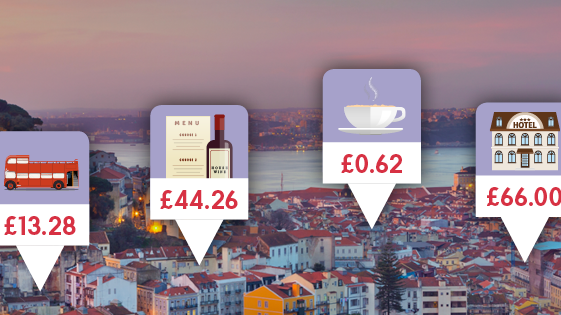
Press release -
Sunshine city beats off challenge from Eastern Europe to top annual City Costs Barometer
10 best value cities: Paphos, Vilnius, Riga, Warsaw, Budapest, Krakow,
Lisbon, Prague, Athens and Palma
Paphos, 2017’s joint European City of Culture, is cheapest of 36 European cities surveyed for the annual City Costs Barometer (www.postoffice.co.uk/citycosts)
Lisbon retains its position as Western Europe’s cheapest capital city
Prices for UK visitors are up across Europe but year-on-year rises are held to 10 per cent or less in a third of cities. In Palma prices are around five per cent lower
After eight years in which Eastern European cities have rated as the cheapest places to take a bargain break, their stranglehold has been broken by Paphos in Cyprus. 2017’s joint Capital of Culture has narrowly beaten the Lithuanian capital, Vilnius, to take top spot in the ninth annual Post Office Travel Money City Costs Barometer of 36 European cities¹.
At £138 for 12 typical city break costs – including an evening meal for two with wine, drinks, two nights’ weekend accommodation, sightseeing and city transport – Paphos is one of four ‘sunshine’ cities in Western Europe to rival Eastern capitals as the best choices for bargain hunters. Lower accommodation costs have helped Palma (£196) leap up to 10th from 18th place a year ago and make it the only city of the 36 surveyed to show a price fall (five per cent). Lisbon (£162, 7th), Western Europe’s cheapest capital city, and Athens (£191, 9th) have both retained their top 10 places for the third year running.
Andrew Brown of Post Office Travel Money, the UK’s leading foreign exchange provider, which accounts for one-in-four currency transactions, said: “This is the first time since we started surveying tourist costs in European cities eight years ago that we have seen so many Western capitals provide the low prices usually associated with Prague, Budapest and other Eastern European cities.
“City breaks have emerged as the most popular type of holiday for UK tourists in the past three years² and, with ongoing uncertainty about sterling, there is good reason for people planning trips to do their homework carefully and check where the pound will give them more for their money. This year the sunshine cities that have made it into our top 10 look great value, with the promise of a sunny climate as well as low prices.”
Close on the heels of Paphos at just under £140 for the 12 city break staples, runner-up Vilnius is the cheapest of the six Eastern European cities with places in the best value top 10. Neighbouring Riga (£150) has overtaken Warsaw (£154, 4th), last year’s top city, and Budapest (£157, 5th) to move into third place. This is because local euro prices have fallen by five per cent in the Latvian capital while accommodation - £54 for two nights - is cheaper than in any other city surveyed.
By comparison, prices in the third Baltic capital, Tallinn (£209), have risen 27 per cent year-on-year, making the overall cost for UK visitors 50 per cent higher than in Vilnius.
But, while the survey found price rises in 33 of the 34 cities also surveyed last year, these have been contained to 10 per cent or less in over a third of those cities4 (excluding accommodation, which has risen more sharply). This is because the cost of tourist items in local currency has risen only marginally and in several cases has fallen by up to five per cent, meaning that the only extra cost to UK visitors comes because of the fall in sterling.
Besides Riga, the biggest local fall has been in 11th-placed Strasbourg (£201) where the cost of meals, drinks, transport and sightseeing is down four per cent on 2016 levels. As a result, Strasbourg is the cheapest of four French cities surveyed. Although Paris (£296) is almost £100 more expensive, here too Post Office Travel Money found evidence of local price cuts (-1 per cent). Lille (£213, 14th) and Nice (£219, 15th) also rate among the better value cities.
Although Amsterdam is another of the cities where local prices have dropped marginally over the past year, the high cost of accommodation (£262 for two nights) has made it the most expensive of 21 Eurozone cities surveyed. At £421, the City Costs Barometer total in this perennial city break favourite is 42 per cent higher than in Paris, its main competitor.
Even pricier are Stockholm (£457) and Reykjavik (£552), the most expensive cities surveyed and highest-priced of six Nordic cities. Aarhus, joint European City of Culture with Paphos n 2017, is the best bet for UK holidaymakers planning trips to Scandinavia. At £316, Denmark’s second city is 43 per cent cheaper than Reykjavik.
Andrew Brown said: “It is important for holidaymakers considering a city break to budget carefully for items like meals, drinks and sightseeing as these are costs that most tourists cannot avoid. Change enough cash before leaving home to cover likely costs – and remember there are better exchange rates for higher value Post Office branch or online transactions.”
City Cost Comparisons At A Glance:
Staying over: This year’s report found that accommodation prices have risen steeply in many of the cities surveyed, with costs varying from £54 to £262 for a two night weekend stay for two in April. For the second year running the lowest-priced accommodation is in Riga (£54), while a £100 year-on-year rise to £262 for two-nights has made Amsterdam almost five times more expensive. Other cities offering cheap accommodation include Paphos (£62), Lisbon (£66), Vilnius (£67) and Budapest (£68).
Meal costs: Most city break holidaymakers will eat restaurant meals during their stay so it is worth checking how costs compare between cities before booking. This year Post Office Travel Money found that five cities offer three-course evening meals for two with a bottle of wine for under £40. Warsaw is cheapest at £32.24, while Paphos (£33.64), Budapest (£34.80), Prague (£35.63) and Athens (£38.95) are also inexpensive. However visitors to Stockholm could pay £137.40; while eating out in Oslo or Reykjavik will set diners back around £140.
Liquid refreshments: Lisbon is by far the cheapest of the 36 cities surveyed for drinks. At just £5.67 for a coffee, Coca-Cola, beer and glass of wine, the Portuguese capital is over a pound cheaper than its closest competitors: Prague (£6.68), Krakow (£6.87) and Vilnius (£6.90). By contrast the same four items are priced at over £25 in Oslo and Reykjavik – mainly as a result of the high cost of alcoholic drinks in both these cities.
Getting around: Return transfers between airports/train stations and city centres costs less than £2 in Vilnius (£1.17) and Warsaw (£1.89) but as much as £22.13 in Bruges and £23.97 in Reykjavik. Transfers are free in Geneva for those staying in city hotels – as is a 48-hour travel card. Two day travel cards can significantly cut the cost of getting around a city and those in Warsaw (£5.16), Krakow (£5.16) and Tallinn (£5.31) are cheapest. By comparison, the Venice travel card (£53.12) costs 10 times as much. Dubrovnik (£7.47) offers best value for a sightseeing bus tour but this will set visitors to Geneva (£40.25) back over five times as much.
Culture Costs: Visits to their three leading cultural attractions cost under £10 in Vilnius (£4.25), Paphos (£.6.64), Palma (£7.97), Riga (£8.86) and Dublin (£9.74). All of these cities, barring Riga, offer entry to one or more of their top attractions free of charge. At the other end of the spectrum, culture vultures will have to pay over £40 to visit the top three attractions in Amsterdam (£44.70), Reykjavik (£42.99), Dubrovnik (£43.69) and Barcelona (£43.37). In Aarhus, which is joint European Capital of Culture with Paphos, entry to three attractions costs £41.85 – over six times more than in the Cypriot city.
City break holidaymakers can purchase euro on demand at over 10,000 Post Office branches and these can also be ordered online at postoffice.co.uk for same day ‘click and collect’ at almost 3,000 branches as well as for next day collection at any of the 11,600 Post Office branches or for home delivery. Other currencies featuring in the City Costs Barometer are available over the counter at more than 1,600 branches and for pre-order in all branches or online purchase.
The full results of the 2017 Post Office Travel Money City Costs Barometer can be viewed online at: postoffice.co.uk/citycosts.
ENDS
For more information, please contact:
Joanne Leahy Post Office Press Office 07484 051566
Categories
About the Post Office
Post Office Limited has an unrivalled national network of over 11,600 branches across the UK, more than all the high street banks combined, and sits at the heart of many communities across the country.
It provides around 170 different services and products spanning financial services including savings, insurance, loans, mortgages and credit cards. Post Office also offers Government services, telephony, foreign currency, travel insurance and mail services.
99.7% of people live within three miles of their nearest Post Office outlet. For many rural communities the Post Office is the only retail outlet. Post Offices remain highly valued and trusted and are the focal point for many communities. For more information, visit www.postoffice.co.uk.




